HCMC – Retailers could claw back some of the lost revenue from the lockdown period as consumers pent up from months of lockdown have embarked on a revenge spending spree.
Cities and provinces where restrictions are lifted have seen high levels of spending and retail foot traffic.
The new freedom alongside the surge in demand have allowed consumers to embark on a revenge spending spree, according to RMIT University academics Hua My Sang, Associate Lecturer of Digital Marketing, and Dr Seng Kiat Kok, Senior Program Manager for Human Resource Management and Entrepreneurship.
However, Dr Seng Kiat Kok warned that “these trends are not without risk, as the potential for a return to lockdown arrangement looms”.
Citing findings by Reuters, he added that “while consumer spending has improved on 2020’s figures, foot traffic and ‘door-buster’ rushes have been replaced by a growing focus on online shopping”.
According to Think with Google, consumers in Vietnam are turning to e-commerce platforms to refresh themselves, their homes, and buying gifts. For instance, Tiki noted a 50% year-on-year jump in transaction volume in January 2021 in the lead up to the Lunar New Year (Tet).
Besides, in a Google Consumer Survey study in May 2021, 39% of consumers shared they plan to make more online purchases during the 2022 Tet season.
According to Kantar, after the intensive lockdown for almost half a year, financial difficulties, and no big celebrations, Vietnamese consumers are looking forward to Tet. Some 44% of consumers in Vietnam are planning to shop for Tet two weeks prior to the festival.
Kantar emphasized that over the past few months, people shopped less frequently but more per trip. This new habit will change the way people shop for Tet 2022. Therefore, brands and retailers should push more combos to maximize the potential of the bulky trip trend.
“There is a need to balance the opportunities and risks involved with revenge spending. The looming cloud of Covid-19 can continuously threaten recovery, as new outbreaks and Covid-19 variants can be a constant worry,” Hua My Sang commented.
She also said that not all populations are keen on revenge spending. Passport, a market research unit of Euromonitor, forecasts that consumer expenditure per household in the Asia Pacific, comprising Vietnam, is set to remain among the lowest globally, due to not only a focus on savings but also as a product of economic inequalities and disruptions in supply chains, hampering both business and consumer confidence.
Sang remarked, “Consumers seem to be taking a more pragmatic view, focusing on savings and maintaining basic needs.” The RMIT associate lecturer elaborated that a large proportion of revenge spending has been focused on food.
The spending on basic necessities in Vietnam increased drastically from 2019 figures, and due to lockdown conditions, consumers have been spending more time at home alongside preparing their own meals, as found by Deloitte’s Vietnam Consumer Survey released in February 2021.
Sang pointed out that “while the retail marketplace and food and beverage sectors might be the first to gain since the end of lockdown conditions, the trend of revenge spending must be viewed with caution”.
“Consumer sentiment is strongly aligned to not only savings but also reflects a cautionary focus on expenditure with a view that economic conditions are still highly uncertain,” she explained.
Deloitte’s 2021 report affirms this with an increase of 30% from 2019 among surveyed respondents seeking to reduce expenditure. While there is indeed revenge spending, consumer discretion with purchases has been more prudent.
Dr Kok advised that in light of these trends and the uncertain new normal, “businesses in Vietnam need to navigate the recovery process carefully”.
“Inevitably, there is a keenness to return to business as normal, with increasing investment, expenditure and a focus on catching up on lost income during the lockdown. What businesses don’t want is a spiraling of not only debt but where opportunity becomes a threat to their survival,” he said.
He further remarked that revenge spending and Black Friday consumer sentiment may only be a short-term respite from the economic uncertainties brought on about by the pandemic.
“The longer-term trends suggest consumers will be more careful with their money where better value-added services and products need to be even more enticing before they decide to spend”, he said.









